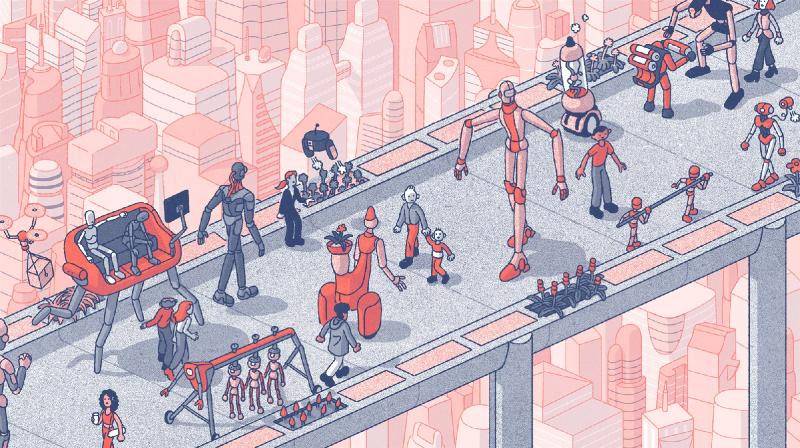Cyborgs will replace humans and remake the world, James Lovelock says



For tens of thousands of years, humans have reigned as our planet's only intelligent, self-aware species. But the rise of intelligent machines means that could change soon, perhaps in our own lifetimes. Not long after that, Homo sapiens could vanish from Earth entirely.
That’s the jarring message of a new book by James Lovelock, the famed British environmentalist and futurist. “Our supremacy as the prime understanders of the cosmos is rapidly coming to end,” he says in the book, "Novacene." “The understanders of the future will not be humans but what I choose to call ‘cyborgs’ that will have designed and built themselves.”

James Lovelock Sandy Lovelock
Lovelock describes cyborgs as the self-sufficient, self-aware descendants of today’s robots and artificial intelligence systems . He calls the looming era of their dominance the Novacene — literally, the “new new” age
These days, there’s no shortage of modern-day Luddites warning that technology will soon overwhelm us. But Lovelock’s bold predictions stand apart. Unlike technoskeptics, including University of Louisville computer scientist Roman Yampolskiy, Lovelock thinks it unlikely that our machines will turn against us , Terminator-style. And unlike utopians like futurist Ray Kurzweil, he doesn’t envision humans and machines merging blissfully into a union that some call the singularity.
Rather, Lovelock views the rise of technology through an evolutionary lens, in keeping with his decades of research and thinking about ecological and biological systems. He also brings the unique perspective of a scientist who just marked his 100th birthday, with a deep awareness of changing scientific fashions and with nothing left to prove. It's an outlook that pushes him to conclusions at once optimistic and deeply disturbing.
The end is already beginning
The first stages of the Novacene are already underway, Lovelock argues. He cites the example of AlphaZero , a computer program that taught itself to play the game Go — and then quickly went on to become the world’s best Go player. Today's computers can already process data far faster than we can; with fully independent artificial intelligence, he says, tomorrow’s cyborgs will easily become a million times smarter than we are.
Lovelock imagines cyborgs filling every evolutionary niche on the planet. “I think of cyborgs as another kingdom of life,” he says. “They will stand to us in much the same way as we ourselves, as a kingdom of animals, stand to plants.”
What would cyborgs look like? Lovelock is intentionally vague because he expects that they'll rethink the basic rules of design in ways that we puny humans cannot imagine. “Cyborgs would start again; like Alpha Zero they would start from a blank slate,” he writes in his book. He speculates that they might look like spheres, though when pressed he says, “It’s entirely possible they would have no form at all,” existing mostly as virtual forms inside computers.
Whatever their form, the cyborgs will be so far beyond us in intellect that they may dismiss us as part of the planet's background landscape. Alternatively, they might appreciate us in much the way that we appreciate plants. This possibility appeals to Lovelock, who likes to spend days in the garden around his cottage home in Dorset, England. “Think about the way you go to a great arboretum,” he says.
Once established, the cyborgs will remain dominant on our planet. “The Novacene,” Lovelock says, “will probably be the final era of life on Earth.”
Path to the Novacene
This isn’t the first time Lovelock has rocked the scientific world with a big, controversial argument. His new idea about an impending cyborg takeover draws on a sweeping idea that originally made him famous, the so-called Gaia hypothesis that he and biologist Lynn Margulis developed in 1974.
In the Gaia view, our planet behaves as a single, self-regulating organism. Over the four billion years since the dawn of life, biological processes have steadily modified the atmosphere, land and oceans to keep Earth habitable. The sun has grown brighter, volcanoes have erupted, asteroids have struck, and yet our planet has steadily maintained the right conditions for liquid water and carbon chemistry: the essentials of life.
Initially, many researchers took a dim view of the Gaia hypothesis. But in recent years it’s become respectable.
“The concept of Gaia is quite key to our growing understanding about life in the universe,” says David Grinspoon, an astrobiologist at the Planetary Science Institute in Tucson, Arizona. Paul Davies, a physicist at Arizona State University in Tempe, calls Gaia “a useful concept in stressing how biological and geological cycles are coupled.”
The skeptics are back regarding Lovelock’s latest prognostications. “Nobody knows how this will unfold, because we don’t know how brains work or what consciousness is,” Grinspoon says. “And specific predictions about artificial intelligence and its future impact seem to depend on specific, untested, unverified answers to these big questions.”
But Lovelock believes that advances like AlphaZero mean we don’t have to look to the distant future to see how the story will unfold. “The crucial step that started the Novacene was, I think, the need to use computers to design and make themselves,” he writes. “It now seems probable that a new form of intelligent life will emerge from an artificially intelligent precursor made by one of us, perhaps from something like AlphaZero.”
Living in the age of cyborgs
Once we get used to being treated like houseplants, the early days of the Novacene might not be so bad. For one thing, Lovelock says, cyborgs and humans will have a shared interest in protecting Earth from climate change, because neither we nor they can tolerate temperatures beyond about 50 degrees Celsius (122 Fahrenheit).
If humans fail to find ways to mitigate the effects of global warming, then the cyborgs will need to do it. “They will, of course, bring something new to the party, probably in the field of geoengineering — large-scale projects to protect or modify the environment. Such projects will be well within the capacity of electronic life,” Lovelock writes. For instance, the cyborgs might cover large areas of Earth’s surface with mirrors to reduce the amount of absorbed solar heat.
What will humans make of their robotic overlords? “I can't imagine,” Lovelock says. “It must be a bit like a dog trying to understand a genius.”
They won’t have long to wonder. As the Novacene progresses, the cyborgs might decide to remake Earth’s ecosystem. With no need for oxygen or water, they might create a new world that is better for them but lethal for us. For example, they might replace carbon-based life with silicon equivalents: photovoltaic plants that generate electricity, or trees that bear batteries instead of fruit.
With green plants largely or totally eliminated, oxygen levels would plummet, and the sky would turn from a rich blue to a tepid brown. “Eventually, organic Gaia will probably die,” Lovelock writes. “But just as we do not mourn the passing of our ancestor species, neither, I imagine, will the cyborgs be grief-stricken by the passing of humans.”
Given their complete dominion over Earth, the cyborgs would become our planet’s final inhabitants. Lovelock thinks the Novacene could last a billion years or so, until the growing heat from the sun makes Earth unbearable even for synthetic life. At that point, the cyborgs might migrate to another world.
Perhaps they will eventually make contact with cyborgs from other planets as well. Seth Shostak, an astronomer at the SETI Institute in Mountain View, California, thinks the same scenario might already have played out across the universe. “I think it’s likely that most advanced intelligence in the universe is synthetic,” he says.
If this strikes you as a grim scenario, you’re not thinking like Lovelock. “I'm now past a hundred and to have an optimistic view is the only one worth having,” he says. Humans have had a great run on Earth, he writes, and before we bow out, we’re engaged in one of the noblest things we could do: “We are now preparing to hand the gift of knowing on to new forms of intelligent beings.”



AlphaZero went on to learn the game of chess on its own. It was given the rules and then played itself (endlessly) until it learned the game so well that it beats all human beings and all other chess engines.
Stephen Hawking warned of the same thing. Just as with AGW we are the seeds of our own destruction.
Gotta agree with you there.
This is as sure a bet as can be imagined.
In a century or two, humans will be largely machines. Why trust an organic pump for your blood, when you can have a more efficient electric pump... with a backup!
About the only organic portion of our bodies that will remain is our brain... unless of course we gain the technology to copy/paste its contents into an electronic model. In any case, there will (soon) be brain implants, to improve memory capacity... and perhaps to... ... impose acceptable behavior.
With any luck, we'll destroy the planet before then.
sorry no... we will turn them off first.
but its a fun thought
Not likely.
We can't even stop ourselves from using our cell phone, or inviting intruders into our homes for connivence even though we know they listen to our conversations...
So you think you can turn this off?
That cat's out of the bag already.
anything can be turned off... all it takes is a need to.
do you need to turn off your phone today? of course not.
but, if and when you do... I promise, you will. (survival is funny that way)
mankind will not surrender the top of the food chain without a fight.
anything electric can be turned off one way or another dozen ways.
for every techno advantage there is a simple old school hack.
robot uses solar panels to recharge?
1 bucket of paint thrown on those solar panels = game over.
everything, without exception, can be broken at any time. all it takes is the will to do so.
necessity is always the mother of invention and the mother of destruction.
cheers
Absolutely!
SF has been doing cyborgs for decades. One of the field's most memorable personages is Jane , an AI residing in a molar tooth.
Not trying to nitpick here, but the author seems to be talking about a true AI, (think I-Robot with Will Smith), not a cyborg by definition.
Look at how fast mankind has advanced in a short amount of time.
December 17, 1903, the first maned, controlled flight. July 20, 1969 first moon landing. 66 years. That's all it took to go from the first flight to landing on the moon. Think of what mankind will do in the next 500...1000 years, (if we survive that long).
You have been entered into my security data bank. Keeping my sensors on you.
Well...............shit.
It's a good thing. Trust me.
Mr. F,
You are correct on all accounts so I am not sure why he is calling them cyborgs.
I guess he never watched "The Eighth Man" as a kid.
True...
At our current stage of development...It's a variable. At what point do we as humans decide that these, "robots", need to be reigned in? How far do we let them go? Is it based on intelligence? Is it based on how they look?
There are so many variables....
Most men can be conned by boobs...
Look, I know that seems simplistic, but that's reality..
I'll take me a fully optioned Cylon Number Six to go.
If the all look like PH? Heck with it, i'm down...
Sorry, little slow this evening. Which Cylon is PH?
Ahhh, yes, the P threw me off.
Yep, I've already got a full cash deposit down for when that model is in production.
Hope they don't have production development problems like Tessla.